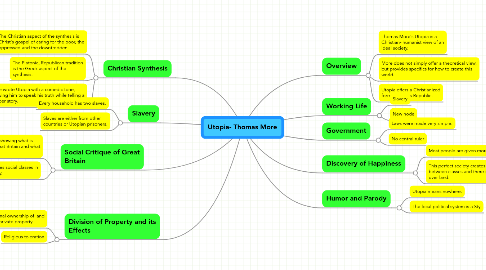Utopia- Thomas More
저자: Rachel Gale

1. Christian Synthesis
1.1. The Christian aspect of the synthesis is Christ's gospel of caring for the poor, the oppressed and the downtrodden.
1.2. The Platonic, Republican tradition is the Greek aspect of the synthesis.
1.3. More wrote Utopia with a comedic tone, allowing him to speak his truth while telling a deeper story.
2. Division of Property and its Effects
2.1. Communal ownership of land and no private property.
2.2. Religious toleration
3. Slavery
3.1. Every household has two slaves.
3.2. Slaves are either from other countries or Utopian prisoners.
4. Social Critique of Great Britain
4.1. The book is showing what is wrong in Great Britain and what should be.
4.2. Includes social classes in society.
5. Overview
5.1. Thomas More's Utopia is a Christian- humanist view of an ideal society.
5.2. More does not simply offer a theoretical view, but provides specifics for how to create this world.
5.3. Utopia offers a Christianized form of Plato's Republic.
6. Humor and Parody
6.1. Utopia means nowhere.
6.2. The local political system is a Sty
7. Working Life
7.1. Slavery
7.2. New node
8. Government
8.1. Laws were made very simple.
8.2. No central ruler
9. Discovery of Happiness
9.1. Most people are given more power.
9.2. This perfect society creates peace between classes and there is no dispute over land.


